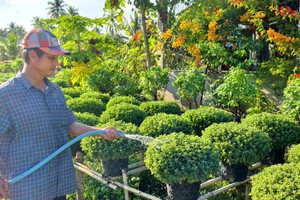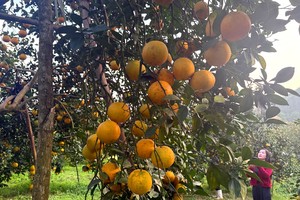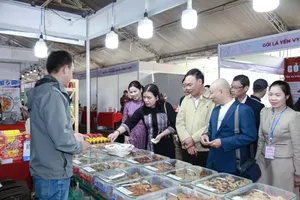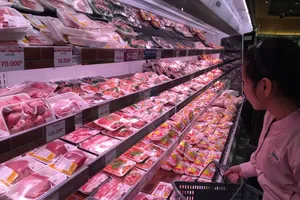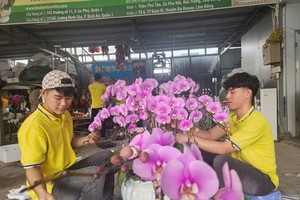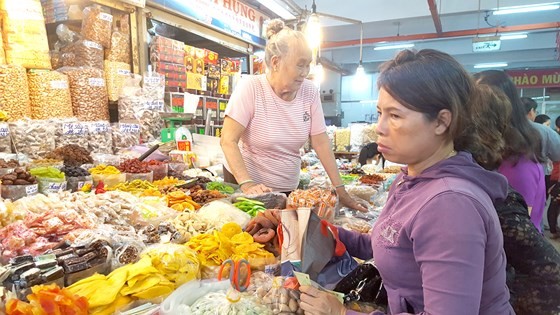
At traditional market like Ba Chieu and Thanh Da in Binh Thanh district, Thu Duc in Thu Duc district, and Pham Van Hai in Tan Binh district, at this time, dried foodstuffs, including dried shrimp, dried squid, dried wood ear mushroom, dried shiitake mushroom and dried glass noodles have been displayed all over the food stalls. Traders have also hoarded dried processed foods, such as beef jerky and dried shredded squid and some newly released products like dried chicken and dried anchovy as because of their convenience, these products are top choice for families to treat their guests during Tet holidays.
A grocer in Thanh Da market said that demand for dried foodstuffs such as glass noodles, wood ear mushroom, shiitake mushroom and dried bamboo shoot usually increases on the occasion of lunar New Year as these are ingredients of traditional dishes of Vietnamese families for Tet. Demand for many kinds of beans and nuts also climbs. Therefore, traders have stockpile a large amount of commodities in order to prevent a hike in price as well as a shortage in supply when consumer demand rises at year end.
The prices of dried foodstuffs were rather stable. Products for high-end market segment were evacuated, labelled and packed in eye-catching packing. Particularly, dried turnip was sold at VND180,000 per kilogram, dried peeled mung bean fetched VND60,000 per kilogram, wood ear mushroom was from VND200,000 to VND250,000 per kilogram, grade-1 dried bamboo shoot was from VND200,000 to VND300,000 per kilogram, dried shiitake mushroom was from VND350,000 to VND400,000 per kilogram, glass noddles was from VND80,000 to VND120,000 and dried wild bamboo shoot was sold at VND450,000 per kilogram.
At Ba Chieu market, sweetmeats and dried foodstuffs were also in display. According to traders in this market, in order to meet buying demand of consumers which usually surges prior Tet holidays, they have stocked a certain amount of goods. However, the volume of sweetmeats stockpiled this year was lower than previous years so as to prevent high inventory after Tet and slow capital recovery.
According to market management boards, in recent years, as people earned more money thanks to developing economy, they tended to buy high quality products for Tet holidays. Therefore, dried foods stores mainly stocked high-end products so the prices were a little higher than those of regular ones. For instance, sweetmeats were mainly from Kinh Do and Hai Ha; sugar-preserved fruits and dried fruits were of prestigious manufacturers. Noticeably, the amount of goods for Tet hoarded for Tet was at a moderate level. There was no sign of overstocking.
Saigon Coop, the largest modern distributor in Vietnam, said that not only traditional distribution channels but modern distribution networks, including supermarket, shopping malls and convenience stores also prepared a plentiful and diversified supply of goods to meet the buying demand of consumers. Saigon Coop stockpiled a worth of VND3 trillion of goods for Tet. At the same time, in order to prevent artificial scarcity and price raise, Saigon Coop has run several promotional campaigns from now to Tet.
In fact, traditional markets have been facing fierce competition from modern distribution networks. They have lost a large number of customers as more consumers are going to supermarket for shopping. Due to competition pressure, traders at traditional markets have started to change their ways of selling to keep their customers. For instance, they have no longer overcharge and become warmer to their customers. They have chosen products of better quality to sell. Most products selling at markets now have clear origins and from prestigious local manufacturers.
Mr Le Van Tien, deputy director of Hoc Mon Wholesale market, said that purchasing power will increase from January 28 to February 2. In order to ensure distribution of goods to consumers, besides reminding traders of making stockpile plans, matters involving food safety should also be focused. Market management boards collaborate with Food Safety Management Authority of Ho Chi Minh City to organize inspections to tightly control the origin and quality of products to help traders to raise awareness in ensuring the quality of their products.



